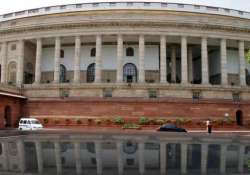Insurance bill passed by Lok Sabha, suspense in Rajya Sabha
New Delhi/Chennai:The Lok Sabha yesterday passed the insurance sector amendment bill, which seeks to hike the foreign equity cap on domestic companies from 26 percent to 49 percent, despite opposition protests.Formally called the Insurance Laws

New Delhi/Chennai:The Lok Sabha yesterday passed the insurance sector amendment bill, which seeks to hike the foreign equity cap on domestic companies from 26 percent to 49 percent, despite opposition protests.
Formally called the Insurance Laws (Amendment) Bill, it seeks to replace an ordinance that was promulgated earlier.
The bill now faces a crucial test in the Rajya Sabha, the upper house, where the ruling Bharatiya Janata Party (BJP) does not enjoy a majority.
The legislation seeks to raise foreign investment cap to 49 percent in the sector, while up to 26 percent foreign capital will be under the automatic route. The balance 23 percent has to get the approval of the Foreign Investment Promotion Board (FIPB).
Members of the Left parties questioned the need for a hike in the FDI limit. Members opposing the bill also pointed out the minuscule claims rejection rate of the Life Insurance Corporation of India (LIC) while the rejection rate was around eight percent for private life insurers.
The opposition members said LIC and the four government-owned general insurers were like ducks laying golden eggs and they should not be killed by bringing in FDI.
Defending the need for hiking the FDI cap, Minister of State for Finance Jayant Sinha said 49 percent was much lesser than in many other countries.
Sinha said the insurance penetration was low in India and needs to be increased.
"The passage of the insurance bill by the Lok Sabha is good news. There is an urgent need for modernising the practice of insurance -- life, non-life and health. Though the old law -- Insurance Act 1938 -- has stood the test of time, it was formulated for governing the sector in a different era," T.S. Vijayan, chairman of the Insurance Regulatory and Development Authority of India (IRDAI), told IANS.
The salient features of the bill are:
* The bill when passed by Rajya Sabha would allow public sector general insurance companies to raise funds from the capital market.
* Start up capital for health insurers would be Rs.100 crore
* Life Insurance Council and the General Insurance Council empowered to act as self-regulating bodies
* Legal recourse to individual customers against insurers
* Flexibility in paying premium through instalments, faster claim settlement, simpler policies, capping on agents' commissions and consumer redressal.
* For insurance companies, the bill provides for more distribution points for insurance policies, less dependence on insurance agents, ability to raise capital from the market, adoption of international best practices by joint ventures (JVs) and greater role of technology to increase electronic issuance of policies.
* Prohibition of repudiation of claims/policies by life insurers, three years after the date of issuance of the life insurance policy/reinstatement of a lapsed policy on the grounds of misstatements in application forms - recognition of family members as "beneficiary nominees" and partial assignments in insurance policies - significant increase in penalties for violations - Rs.25 crores for investments, rural and social sector non-compliances; liability of insurers for violations of code of conduct by insurers - penalty up to Rs.1 crore
* Specific prohibition of multi-level marketing in insurance - recognition of tier-II capital (e.g. perpetual bonds of RBI) for insurance companies - removal of compulsory dilution of equity to 26 percent by Indian promoters after 10 years.
* Converting "corporate agents" into "intermediaries".
* Reconstitution of Life Insurance Council and General Insurance Council to include members representing policy-holders, intermediaries, NGO/self help groups and person of eminence.
* Foreign reinsurers allowed to open branch offices in India.